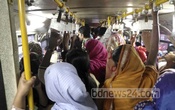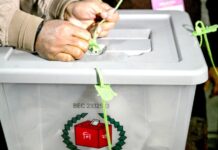Seats marked for women in buses across Bangladesh are often occupied by male commuters who appear reluctant to vacate them.
If a woman passenger insists on her rights to occupy seats marked for the fair sex, verbal duels are heard.
Many women just avoid the hassle and quietly travel standing to avoid unseemly confrontation with men in no mood to relent.
Most 32-seater buses in Dhaka and Chittagong or elsewhere have between 9 to 12 seats reserved for women, children and the handicapped.
When the seats are vacant, male commuters begin to occupy them. When a women turns up, the men refuse to get up.
When a woman commuter insists on her rights to take a reserved seat, groups of male commuters often bombard her with less than kind remarks.
‘Nafia’, a student of Jagannath University, said if these male commuters are asked to vacant the reserved seats, they harshly ask why I want to sit now, despite knowing there is no seat left on the bus.
“They do not want to get up; rather some say if you have a problem commuting in a public bus, use your own car for travelling,” she said.
“On the other hand, when women sit down in the general seats, they ask us to go sit on the ‘female’ seats,” Nafia added.
She felt that the number of reserved seats should be increased.
Sometimes the situation is the opposite as well. Some men sit on the reserved seats, but vacate them on seeing a woman board the bus.
A journey by bus in Dhaka
March 12, 9:15pm.
A bus of Winner Transports, which starts from Azimpur and goes to the last stop Kurhil via FDC, Mohakhali, Gulshan and Badda.
When men were asked to leave the reserved seats, a feud started.
The driver and his assistants showed no interest in controlling the situation.

A male passenger said, “These seats are for handicapped people, not for women. Do you female folks consider yourselves handicapped?”
Another man sitting on the reserved seats said, “These seats are for women, not for young women.”
“What do these girls want? Priority, equality or decency?” asked another man.
Attempting to make them understand the problem, a woman said “How are we supposed to hold the metal bar while standing like men?” She was referring to the fact that the average height of Bangladeshi women was not considered while installing the bars.
Some men started laughing.
A passenger asked the female passengers to maintain decency in their speech.
Another male passenger expressed his frustration about not having reserved seats for men.

Mozammel Hoque, secretary general of Bangladesh Passengers Welfare Association, said government ‘lethargy’ has forced women to face these hassles every day.
He told bdnews24.com, “The matter has remained verbal. A circular would have solved it.”
He added that to reach the goal of being a country of middle income range, Bangladesh must ensure equal participation of male and female citizens at the workplace.
He mentioned a report that says 18 percent of the total Bangladeshi human resource is women, especially in cities the number weavers between 25-30 percent.
“We need to facilitate their commuting. Otherwise, facing such harassment will make a lot of women lose interest in working,” Hoque added.
Women’s rights activist Khushi Kabir said, women find it uncomfortable to sit with men in an extremely crowded bus.
She said, “If there is a policy regarding this issue and if refusing to follow that policy results in a verbal warning or some punishment, then the issue might be resolved.”
According to AMN Siddiq, Secretary of Roads Transport and Highway Department, “Bangladesh Road Transport Authority (BRTA) works to ensure reserved women’s seats in public transports. Some regulations are mentioned when the route permits are distributed.”
But he acknowledged the incidents happening in public transports regarding those seats.
Nurul Islam, one of the directors of BRTA, said a mobile court of BRTA oversees the issue.
He said, the existing laws can be utilised to take steps against those who cause trouble regarding these seats.
Source: bdnews24










